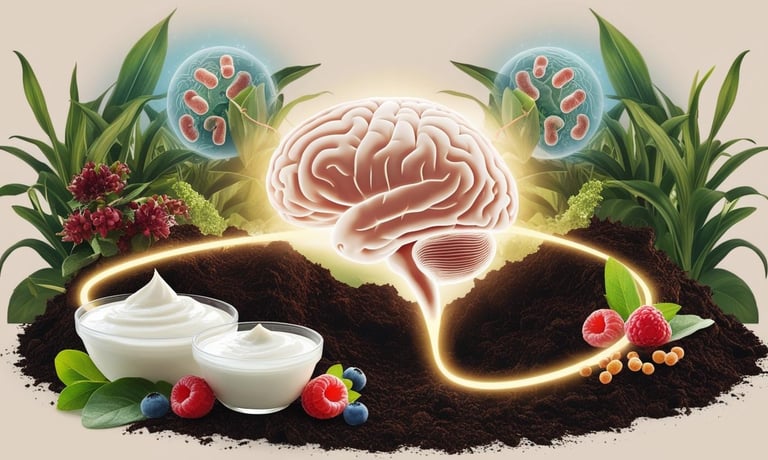Food Affects Mood: Gut-Brain Axis Insights
HEALTH & WELLNESS
By Sia Imime
5/14/20254 min read


Disclosure: This article contains affiliate links, meaning that if you purchase through them, I may earn a small commission at no extra cost to you. I only recommend products that I believe will add value to your personal growth journey.
Have you ever felt anxious after too much caffeine or unusually calm after eating a warm bowl of oatmeal? That’s no coincidence. Modern science confirms that what you eat deeply influences how you feel. This powerful relationship is called the gut-brain connection, and it’s changing the way we understand emotional well-being.
Recent studies show that your gut microbiome—the trillions of bacteria living in your digestive system—affects your brain, mood, and behavior through chemical signaling. Researchers like Dr. William Davis, author of Super Gut, have demonstrated how specific probiotic strains, like Lactobacillus reuteri (L. Reuteri), can boost the production of feel-good hormones and reduce anxiety.
In this article, you'll learn:
The science behind the gut-brain axis
How certain foods can boost or crash your mood
What foods and supplements support mental clarity and emotional balance
Our recommended products to improve your gut health
1. The Gut-Brain Axis: Your Second Brain
The gut-brain axis is the two-way communication network between your gut and your brain, primarily via the vagus nerve. This system regulates everything from digestion to mood and immune response.
Did You Know? 90% of the body’s serotonin—the "happy hormone"—is produced in the gut, not the brain.
The enteric nervous system (ENS), produces neurotransmitters like dopamine, serotonin, and GABA, directly impacting how we feel emotionally.
2. Microbiome Mood Makers: Friendly Bacteria and Mental Health
A healthy gut microbiome helps regulate mood by producing:
Serotonin: Improves mood and emotional stability
GABA: Reduces stress and promotes calmness
Dopamine: Boosts motivation and pleasure
Imbalances in gut bacteria (called dysbiosis) have been linked to:
Anxiety
Depression
Brain fog
Fatigue
Study Spotlight:
A 2019 review published in Nature Microbiology found significant differences in the gut microbiota of individuals with depression versus healthy controls, linking emotional health directly to gut flora diversity.
3. The Enteric Nervous System (ENS): Your “Second Brain” in Action
The Enteric Nervous System (ENS) is often called the "second brain" for good reason — it's a vast network of over 100 million neurons located in the lining of your gastrointestinal tract, stretching from your esophagus to your rectum. It operates semi-independently from the central nervous system but communicates constantly with the brain via the vagus nerve.
🧠 What the ENS Does:
Coordinates digestion and gut motility
Regulates immune responses in the gut
Produces neurotransmitters like serotonin, dopamine, and GABA
In fact, about 90–95% of your body’s serotonin is produced in the gut — mainly by enterochromaffin cells and neurons within the ENS.
4. Microbiome: The Neurotransmitter Influencer
Your gut microbiome—a community of trillions of bacteria, fungi, and other microbes—doesn't directly produce neurotransmitters in the way neurons do, but it plays a crucial regulatory role.
🦠 How Gut Bacteria Influence Mood:
Certain probiotic strains like Lactobacillus reuteri and Bifidobacterium infantis can produce GABA and serotonin-like compounds
Microbes metabolize dietary tryptophan (an amino acid) into serotonin precursors
The microbiome produces short-chain fatty acids (SCFAs), which affect brain function and reduce inflammation
These microbes send signals to the ENS and central nervous system, modulating mood, anxiety, and even behavior
Think of the ENS as the neurochemical factory, and the microbiome as the supplier and supervisor—delivering raw materials and giving input that affects production levels.
5. Dr. William Davis and the Power of Lactobacillus Reuteri
In Super Gut, Dr. William Davis introduces the benefits of homemade yogurt fermented with Lactobacillus reuteri DSM 17938. This strain stimulates the release of oxytocin—the "love hormone"—which is associated with:
Reduced anxiety
Improved empathy
Heightened emotional resilience
Try It at Home:
Make your own L. Reuteri yogurt with this probiotic starter culture.
Recommended:
✔️ L. Reuteri Probiotic Starter Culture – Super Gut Friendly
Helps you make the high-potency yogurt Dr. Davis recommends.
6. Foods That Help or Hurt Your Mood
✅Mood-Boosting Foods
Fermented Foods: Kimchi, sauerkraut, kefir, and yogurt
Omega-3 Fatty Acids: Found in salmon, walnuts, chia seeds
Dark Chocolate: Rich in magnesium and phenylethylamine (PEA)
Leafy Greens: High in folate, essential for dopamine production
Bananas: Natural source of tryptophan and vitamin B6
❌ Mood-Killing Foods
Processed Sugar: Causes spikes and crashes in energy and mood
Refined Carbohydrates: Can contribute to inflammation and brain fog
Alcohol: Disrupts gut flora and reduces serotonin over time
Artificial Sweeteners: Can negatively affect microbiome diversity
7. Supplements to Support the Gut-Brain Axis
If diet alone isn’t enough, supplements can help rebalance your gut and support mood regulation.
Top Recommended Gut-Brain Support Supplements:
L. Reuteri Probiotic Supplement (Live Culture)
Supports oxytocin and emotional well-being
Prebiotic Fiber Blend – Acacia, Inulin & FOS
Feeds your good bacteria and enhances gut diversity
Reduces inflammation and supports serotonin pathways
Magnesium Glycinate Supplement
Calms the nervous system and improves sleep
Ashwagandha Adaptogen Capsules
Helps reduce cortisol, balances mood
8. Simple Daily Practices to Support Gut and Mood
Start your day with prebiotic fiber
Practice mindful eating—slow down and chew thoroughly
Stay hydrated to support digestion and nutrient absorption
Prioritize sleep—gut bacteria are sensitive to circadian rhythms
Exercise regularly to boost both gut and brain health
9. Walking in Nature: A Natural Boost for Your Microbiome
Your microbiome isn’t shaped by food alone—your environment matters too. Walking in forests, gardens, or parks exposes you to millions of natural microbes that can enrich your gut and skin microbiome.
Fun Fact: A single hour spent in nature can expose your body to a diverse range of beneficial bacteria and fungi, especially through contact with soil, plants, and fresh air.
Science-Backed Benefits:
A 2020 study in Science Advances found that contact with natural environments increases microbiome diversity, particularly in the skin and gut.
Microbes like Mycobacterium vaccae, commonly found in soil, have been linked to reduced inflammation and elevated mood by stimulating serotonin production.
Children raised in close contact with natural environments tend to have stronger immune systems and lower rates of allergies and autoimmune conditions, all thanks to richer microbial exposure.
How to Harness This:
Walk barefoot on grass (if safe and clean)
Garden with bare hands
Touch tree bark, leaves, or soil
Choose green parks over paved paths
“Exposure to nature helps rebalance the human microbiome, making us more resilient—emotionally and physically.” – Microbiome Institute Research Summary
Conclusion: Your Diet Is More Emotional Than You Think
The phrase "you are what you eat" now takes on a whole new meaning. Scientific evidence shows that your emotions are deeply connected to your gut health—and your gut is directly influenced by what you eat.
By nurturing your microbiome with mood-supporting foods, probiotics, and smart supplementation, you can literally feel better from the inside out. With expert-backed solutions like Dr. William Davis’s L. Reuteri yogurt and gut-enhancing Amazon products, you're one step closer to emotional balance and clarity.
Related Topics: Build a Healthy Relationship with Food
Tags: gut-brain axis, microbiome and mood, probiotic benefits, mental health nutrition, L. reuteri, emotional well-being, gut health foods, mood-boosting diet, Dr. William Davis, serotonin and gut
